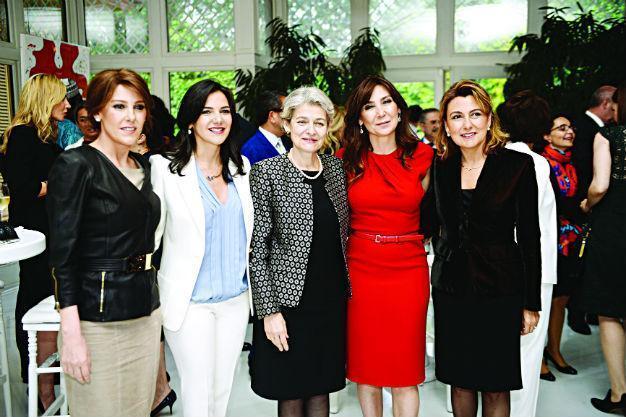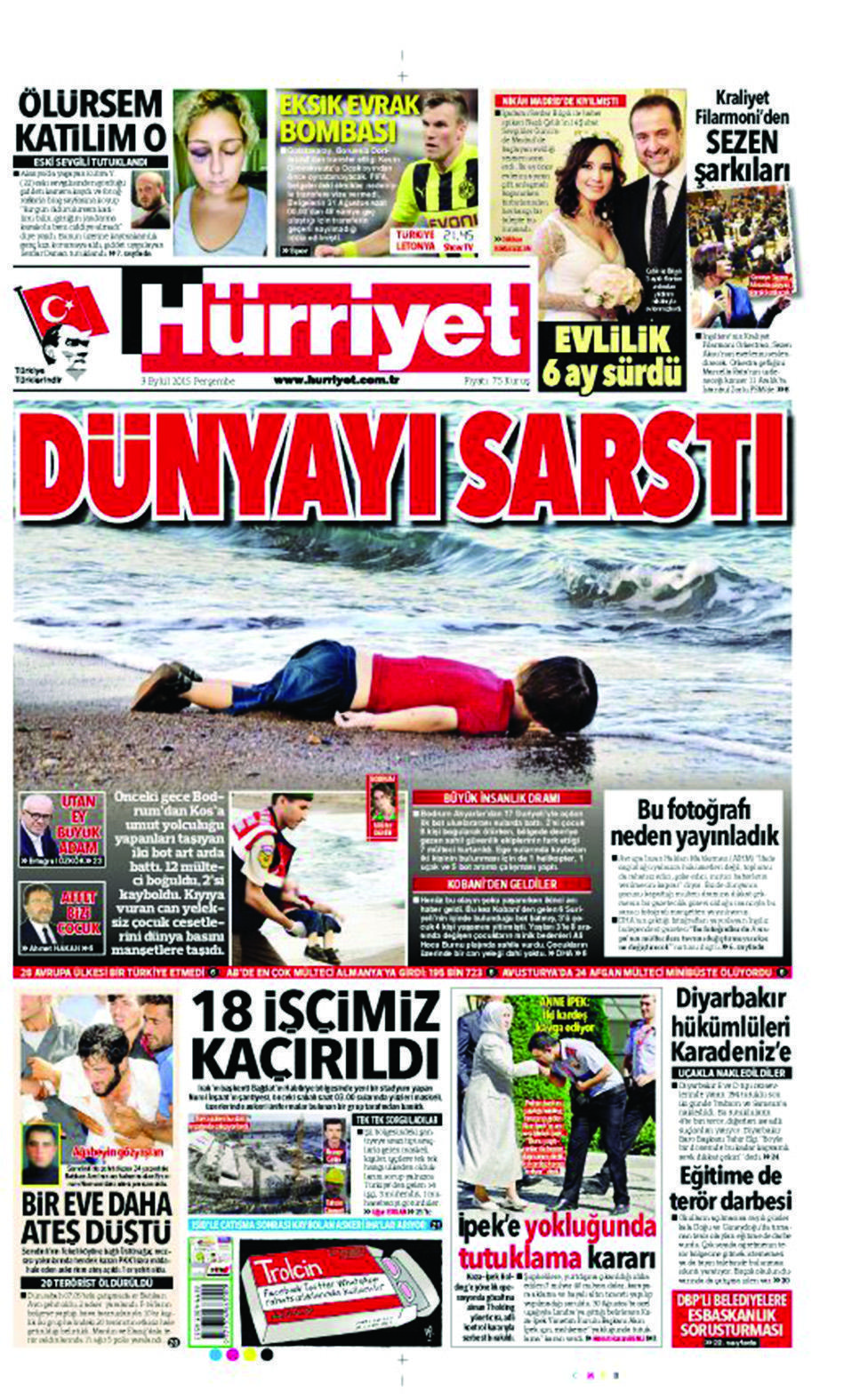‘A photo changed fate of Syrian migrants,’ says Hürriyet chairwoman
İpek Yezdani – ISTANBUL

When the Syrian refugee crisis started, most people were busy with the number of refugees and the cost associated to it, Hürriyet Chairwoman Vuslat Doğan Sabancı has said, adding that this was the case until Doğan News Agency reporter Nilüfer Demir photographed the body of a little child, Aylan Kurdi, washed ashore in Turkey.
Doğan Sabancı, who will chair a media session at the United Nations Humanitarian Summit in Istanbul on May 24, hosted a group of distinguished event guests May 22 at a dinner at her house, including UNESCO Director Irina Bokova, who also highlighted right to free speech.
“This photo got published in more than 3,000 publications all around the world and instantly it reminded all of us the first sentence of the Universal Declaration of Human Rights, which is: Every human being has the right to live in dignity,” Doğan Sabancı said while addressing the invitees, adding that the photo changed the world’s look on the migrant crisis.
“This example and many more show the important role of media in humanitarian issue and the necessity of NGOs and media to cooperate with each other more than ever in order to bring peace to the world.”
Political instability and climate change cause crises that affect a vast number of people, Doğan Sabancı said.
“The media’s role is vital especially in crisis times like this. In order to get to the heart of the problems, the public needs unbiased, accurate reporting about what is going on in the field. This is an absolute necessity in order to fully grasp the situation,” she said.
However, this is not an easy task, the chairwoman highlighted, noting that war-zone reporters were putting their lives at risk for information.
“For four decades, we, as the Doğan family, are committed to independent journalism here in our country. Hürriyet was founded in the aftermath of Turkey’s [move to a] multi-party democratic system. We’ve lost one of our editor-in-chief’s to a terrorist attack. We know by experience the dangers of independent journalism. So as a media representative, I would like to take the chance and thank the U.N. for its Plan of Action which aims to monitor threats against journalists, as well as setting up mechanisms to protect and train them,” Doğan Sabancı said.
The media has yet another vital role in addition to independent reporting, the chairwoman said.
“Especially at times when there is increasing polarization on almost every topic in nearly every society. We hear more and more segregating rhetoric and hate speech in politics, society and media. Islamophobia is a result of that. Division as such creates monologues rather than dialogues, which makes it impossible to search for solutions to today’s problems. On the contrary, media, can provide a space where conflicting voices can express themselves, without fear and they can be heard on the playing field of respect and grace,” she said.
“Media, in addition to exercising the right to information and free speech but also contributes to social harmony, peace and reconciliation. That can only be achieved through seeing other people’s dignity and right to be heard.”
Bokova said, meanwhile, said security was one of the leading problems for journalists.
“We unfortunately know that the numbers of journalists killed in conflicts is increasing and we still know that the majority of those are local reporters killed in criminal activity,” Bokova said.
“That is why UNESCO has in our mandate the responsibility to promote freedom of expression. We have initiated a U.N. state of action for the security of journalists and impunity, this is very important. We work along the spectrum – I am extremely encouraged to see so many journalists, NGOs and civil society groups like Reporters Without Borders [engaged in press freedom work],” Bokova said. “Apart from all the concrete progress and projects, we have a full-fledged program on freedom of expression and communication,” she added.
The summit also focuses on the education of refugee children, Bokova said.
“We’ll start here speaking about the children, education, about the lost generation. And tomorrow we will have a number of discussions and debates about education, we will be launching an important platform in education, we don’t want to see a lost generation,” the UNESCO head said.
U.N. officials, politicians, journalists and representatives of the business world and non-governmental organizations, including Assistant Secretary-General and Director of the U.N. and Regional Bureau for Europe and CIS at the United Nations Development Programme (UNDP) Ayşe Cihan Sultanoğlu; U.N. Secretary-General Envoy on Youth Ahman Alhendawi; Turkish Foreign Ministry Undersecretary Feridun Sinirlioğlu; Deputy Undersecretary Ayşe Sinirlioğlu; French Consul General to Istanbul Muriel Domenach; Boğaziçi University Rector Professor Dr. Gülay Barbarosoğlu; Republican People’s Party deputy Gülsün Bilgehan; CHP adviser and MP Erdoğan Toprak; Hürriyet Editor-in-Chief Sedat Ergin; Hürriyet Daily News Editor-in-Chief Murat Yetkin; Bild Editor-in-Chief Tanit Koch; Norwegian Refugee Council Director Benedicte Glaever; U.N. UNICEF Ambassador and actress Tuba Büyüküstün and Aydın Doğan Foundation Chairwoman Candan Fetvacı all attended the soirée.
 When the Syrian refugee crisis started, most people were busy with the number of refugees and the cost associated to it, Hürriyet Chairwoman Vuslat Doğan Sabancı has said, adding that this was the case until Doğan News Agency reporter Nilüfer Demir photographed the body of a little child, Aylan Kurdi, washed ashore in Turkey.
When the Syrian refugee crisis started, most people were busy with the number of refugees and the cost associated to it, Hürriyet Chairwoman Vuslat Doğan Sabancı has said, adding that this was the case until Doğan News Agency reporter Nilüfer Demir photographed the body of a little child, Aylan Kurdi, washed ashore in Turkey. 